【Contents】
- Do you have these symptoms suddenly? (child)
- Do you have these symptoms suddenly? (elderly)
- Do you have these symptoms suddenly? (adult)
- How to ask for an ambulance (#119).
- How to ask for an ambulance by a mobile phone.
- How to ask for an ambulance by a public phone.
- Actions to take until an ambulance comes.
- Actions to take after an ambulance arrives.
- Actions to take when you arrive at a hospital.
- When you can’t decide whether to ask for an ambulance or not.
- App Q-suke
- Emergency Security Center (#7119)
- Telephone consultation for medical about child (#8000)
1.Occurrence of illness and injury.
Do you have these symptoms suddenly?
- child
- elderly
- adult
Call an ambulance (119) immediately when child or elderly in particular have the above symptoms suddenly!
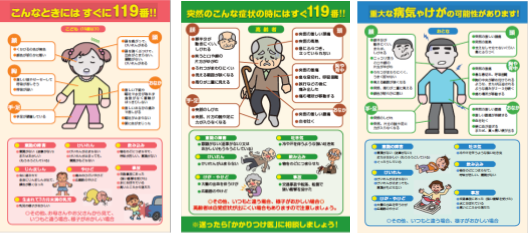
- An ambulance is used to take a person who needs getting immediate medical care because of traffic accidents or sudden illnesses to an emergency hospital.
Please call ambulance only when you’re in an emergency situation.
- If you dither over whether or not to call ambulance, you can use App Q-suke or call Emergency Security Center (#7119) that works in certain areas. However, if you don’t have confidence in your Japanese, you should have a person who can speak Japanese call.
- If your child will get sick or hurt on the weekend or at night when hospital is closed, you can use Telephone consultation for medical about child (#8000). This is a telephone consultation that you can get some advice from a pediatrician and a nurse. If you don’t have confidence in your Japanese, you should have a person who can speak Japanese call.
✔When you judge it’s hard to handle by yourself, you should call someone immediately.

In case that you can’t communicate or you feel it’s hard to handle by yourself, you should find someone who can understand Japanese (e.g. neighbor, colleague and passer-by) and ask for help.
Even if they can’t understand what you say, if you say “Help!”, they can understand you are in the emergency.
2.Call 119 (an ambulance).
When an illness or an injury are serious and (she/he/they) should get treated, you can call an ambulance.
The number that you call an ambulance is 119.

Anyone who see a sick or injured person will be shaken up.
Calm down, tell your situation and ask for help clearly and slowly.
In addition, if you don’t have confidence in your Japanese, don’t forget to ask a person who is near you for help.
- In Japan, we can call an ambulance by a phone anytime and anywhere. You don’t have to pay the fee for taking someone to the hospital.
- You call 119 when you need an ambulance, but 119 is the phone number of the fire station. You can call not only an ambulance but also a fire engine.
- An ambulance is used to take a person who needs getting immediate medical care because of traffic accidents or sudden illnesses to an emergency hospital.
Please call ambulance only when you’re in an emergency situation.
■■■How to ask for an ambulance (#119).■■■
When you call 119, the operator of the center will ask you the followings.
- Tell the operator you are in a medical emergency.
Operator: ”119. Are you in a fire emergency or a medical emergency?”
You: “Medical emergency.”
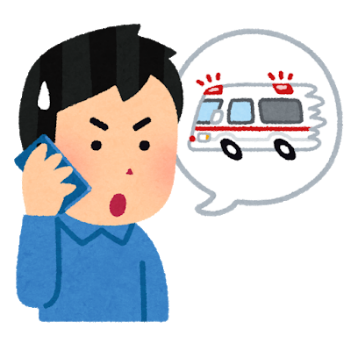
- The center of 119 receive reports of both a fire and a medical emergency, so please tell ‘Medical emergency’ clearly.
- Tell the operator the address that an ambulance should go.
Operator: “Where is the location?”
You: “The address is ○○shi □□machi △chome ◇banchi.”
- Please tell the name of the city at first. If you don’t know the address, tell a nearby big building or intersection as a landmark.
- You can describe your location by telling a controlled number of the telegraph pole, the traffic light or the traffic sign as well as an address sticker of the vending machine. If you don’t know the address, search these things near you.
- Tell the patient’s symptoms.
Operator: “What happened?”
You: “My father collapsed from a pain in his chest.”
- First, please tell clearly who, how, what happened. And please tell whether the patient is conscious or not, whether the patient is breathing or not as far as you know.
- If there are several sick or injured person, tell the number of people.
- There are cases in which you are asked about the patient’s chronic illness, family doctor and the detailed situation when the patient collapsed. Answer as far as you know.
- Tell the patient’s age.
Operator: “How old is that person?”
You: “65 years old.”
- If you don’t know the patient’s age, tell the impression like ‘sixties’, ‘thirties or forties’ or ‘elementary school student’.
- Tell your name and a phone number.
Operator: “Please tell your name and a phone number.”
You: ”My name is ○○○○. My phone number is ・・・・.”
- Please tell a phone number that you can contact with them easily (e.g. mobile phone number). There are cases in which you get a phone call from ambulance crews to check your location, so you don’t turn off your mobile phone after talking.

<How to ask for an ambulance by a mobile phone.>
Call 119.
Please wait on the spot and don’t turn off the mobile phone. Because there are cases in which you get a phone call from the fire station after talking.
- If you want to call while driving, stop your car at a safety place, and then call 119.
- If there are the landline or the public phone near you, use these preferentially.
<How to ask for an ambulance by a public phone.>
You can call 119 by using a public phone.

■Green public phone
- Pick up the receiver.
- Push ‘the button of emergency call’.
- Dial 119.

■Grey public phone or public phone of prepaid card type
- Pick up the receiver.
- Dial 119.
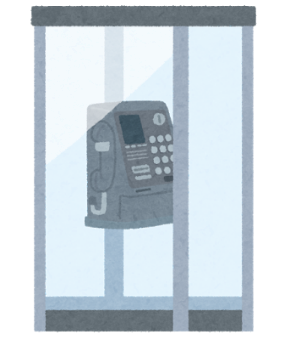
■Pink public phone
・In the case of the public phone with the button of emergency call.
- Pick up the receiver.
- Push ‘the button of emergency call’.
- Dial 119.
・In the case of the public phone without the button of emergency call.
- Pick up the receiver.
- Dial 119.
3.Actions to take until an ambulance comes.
If you call 119 by a mobile phone, wait on the spot without turning off the power.
If there are some people, chose a person who waits outside and leads ambulance crews.
(Attention) Ambulance crews will choose and carry a patient to an emergency hospital judging from the condition of illness or injury, the circumstance and the place. So, it is not necessary that the patient are carried to the hospital of your choice.
And you should prepare following things as much as possible.
- A passport (In the case of foreigners)
- A residence card (In the case of foreigners)
- An insurance card
- A hospital registration card
- Cash
- The medical information kit
- Shoes (In particular, when a patient collapse in doors like in a house)
- Regularly-taken medication or a medication note
- A maternal and child health handbook, a disposable nappy, a baby bottle, towels (In the case of babies and little children)
4.Actions to take after an ambulance arrives.

When the ambulance is coming, give a signal to them like waving your arms.
Tell the following after that ambulance crews are arrived.
■The situation when the patient gets sick.
■The change in the patient’s physical condition before that an ambulance is arrived.
■Details about the treatment that you done.
■The information of the patient (e.g. chronic illness, regularly-taken medication, family doctor)
If the foreigner who can’t speak Japanese is carried to the hospital, have the person who can speak Japanese accompany as much as possible.
5.Actions to take when you arrive at a hospital.
If it is hard for you to communicate in Japanese, ask the person who can speak Japanese to be an interpreter.
If you have a chronic illness and/or a regularly-taken medication, the medical information kit or a medical questionnaire are helpful.
You should prepare the following things regularly.
- The medical information kit (download)
- A medical questionnaire (download)
- A medical questionnaire: In the case of suspected heatstroke. (download)
6.When you can’t decide whether to ask for an ambulance or not.
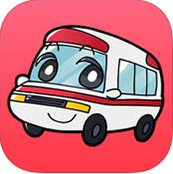
Everyone feel uneasy when they get sick or injured suddenly.
We understand it’s not easy to make a cool-headed decision if you should call an ambulance or you can go to the hospital after waiting and seeing for a while.
■Should I go to a hospital or a clinic?
■If I go to the healthcare agency, should I hurry? Or, is it no problem to wait?
■Should I call an ambulance?
In these cases, use App Q-suke that is produced by Fire and Disaster Management Agency.
You can use this app on a mobile phone or WEB.
- Download the app.
It is very difficult for everyone to make a cool-headed decision in the case of emergency.
Download this app in normal times, keep ready at any time to use.
- Know a degree of urgency by the app.
Launch the app and chose appropriate symptoms on the screen.
A measure of degree of urgency is shown in colors (red, yellow, green) depending on your chosen symptoms.
| Degree of urgency | Necessary actions |
|---|---|
| Call an ambulance immediately. It seems the degree of urgency is high. Call 119 immediately.※You can call 119 directly from the button ‘Call 119’. |
|
| Go to the healthcare agency as soon as possible. It’s not like you use an ambulance, but you should go to a hospital as soon as possible. |
|
| Go to the healthcare agency. However it is not an emergency. If it happens at night, you can go to the healthcare agency tomorrow. |
|
| Keep waiting and seeing carefully. We recommend a follow-up in your house or visiting a doctor during consultation hours. |
- Take action depending on the degree of urgency.
When it is deemed the degree of urgency is high, you can call 119 directly from this app.
When it is deemed the degree of urgency is not high, you can search information about the healthcare agency which you can go and the transportation (e.g. Taxi) on this app.
The degree of urgency which is shown on this app is simply the standard.
If the degree of urgency is not high, go to the healthcare agency before symptoms become severe.
■■■Emergency Security Center (#7119)■■■
When you call 7119, you can receive following services.
■A operator tells you phone numbers of healthcare agency that you can see a doctor.
■A counselor like doctor or nurse tells you if you should go to the hospital by yourself or call an ambulance like that.
■A counselor like doctor or nurse gives you some advices about the way of first aid depending on your symptoms.
■A counselor like doctor or nurse provides support for calling an ambulance when they decide that the degree of urgency is high.
However, this service is offered for limited areas only.
Call 7119 after you confirm if it is offered in the area where you live.
| Area where it is established ‘#7119’. (as of December 1, 2019) | |
| Service in the entire area of prefecture. | Miyagi, Niigata, Ibaraki, Saitama, Tokyo, Osaka, Nara, Tottori, Yamaguchi, Tokushima, Fukuoka |
| Service in limited areas of prefecture. | around Sapporo City, Yokohama City, around Kobe City, around Tanabe City, around Hiroshima City |
■■■Telephone consultation for medical about child (#8000)■■■
Everyone feel uneasy when your children get sick or injured suddenly.
When it will happen as above on holiday or at night, it’s no easy to make decision if you should call an ambulance or you can go to the hospital after waiting and seeing for a while.
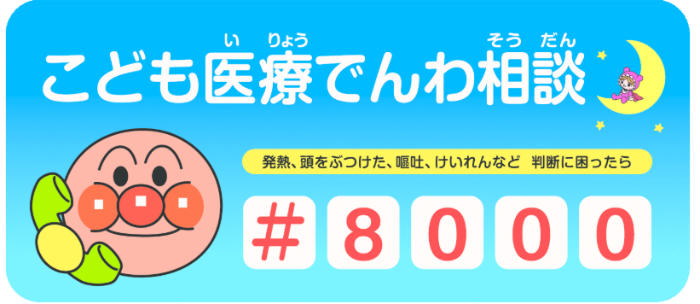
I don’t know how to deal with a sudden fever of my child.
My child is getting exhausted after vomiting. (He/She) calms down now, but is it alright if I wait and see until next morning?
My child fell and hit (his/her) head on the floor in the house. It seems to bleed a little, but should I go to the hospital immediately?
etc.
Telephone consultation for medical about child provide the common phone number which we can call at times as above.
If you just call 8000, you can consult a pediatrician or a nurse.
・The above contents are created with reference to the following information. If there is a change in the contents of the reference source, it may take some time to be reflected on this site. Thank you for your understanding.
【References】
・”In what kind of situation, how to call? The way to use of an emergency in case of emergency.” Cabinet office-online
(https://www.gov-online.go.jp/useful/article/201609/1.html)
・”Emergency Medical Care Handbook for Foreigners” (English, Chinese, Korean and Portuguese ver. Able to download in PDF.) Hiroshima prefecture
(https://www.pref.hiroshima.lg.jp/soshiki/53/qq-f-handbook.html)
・”Appropriate use of an ambulance” Fire and Disaster Management Agency of Ministry of Internal Affairs and Communications
(https://www.fdma.go.jp/mission/enrichment/appropriate/appropriate006.html)
・”About telephone consultation for medical about child enterprise(#8000)” Ministry of Health, Labour and Welfare
(https://www.mhlw.go.jp/topics/2006/10/tp1010-3.html)













